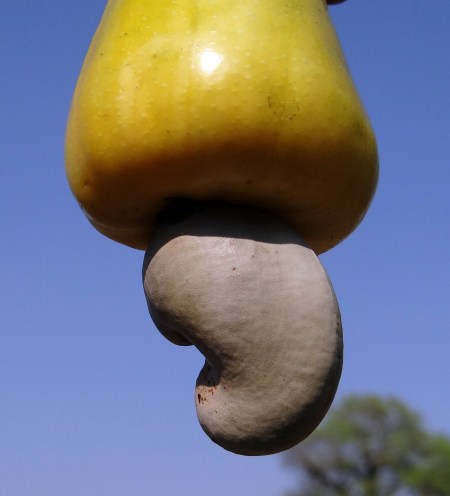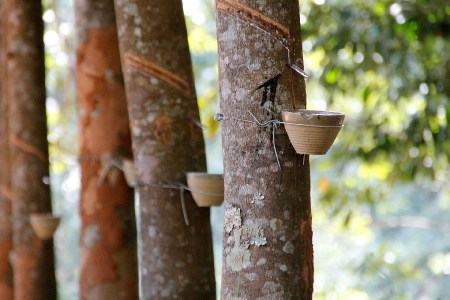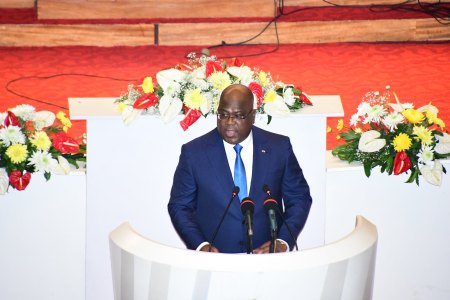Accepted on June 6 by the members of the Organization of the Petroleum Exporting Countries (OPEC) and their allies in the OPEC + alliance, the extension of the reduction in oil production may not be enough to revive the sector in the short term. In a note published in the wake of the OPEC+ announcement, the specialist consultancy Rystad Energy estimates that oil and gas revenues could plunge by 40% in 2020 compared with 2019. If confirmed, this could result in a 25% reduction in investment in the sector in the first half of 2020, to USD 410 billion, according to Rystad Energy.
De News
SMB-Winning obtains the final green light for the operation of the Simandou project
Discovered in the 1990s, the Mount Simandou iron deposit could finally be developed in the near future. On June 4, the Guinean government endorsed the basic agreement for the exploitation of Blocks 1 and 2 of Mount Simandou by the Guinean-Chinese consortium Société minière de Boké (SMB-Winning). Stake : To launch the exploitation of the…
IDA grants a $160 million credit to Benin’s agricultural sectors
The World Bank’s branch dedicated to poor countries, the International Development Association (IDA) has approved a $160 million credit for Benin to increase the competitiveness of its agricultural sectors, particularly pineapple and cashew nut exports. In particular, the institution has indicated that nearly 10,000 hectares of pineapple plantations and 135,000 hectares of aging cashew nut plantations will be replaced or newly developed. On the logistics side, the disbursed funds will be used in part for the construction of a freight terminal for the cold storage of perishable products and the rehabilitation of 1,200 km of roads.
Despite Covid-19, African food security should be preserved, according to CIRAD
Despite the Covid-19 health crisis, the food security of much of the African continent should be safeguarded. This is essentially the conclusion of the latest study published by CIRAD, France’s leading agricultural research organization. Released on 2 June, the note highlights the relative resilience of coastal West African countries - Côte d’Ivoire, Benin and Togo - to the shock caused by the Covid-19 epidemic. To explain this, CIRAD teams note, firstly, that « these countries produce a lot of cassava, plantain, yam and sorghum, which are crops that are not very intensive and require very little fertilizer and pesticides « . In addition, and with the exception of cocoa cultivation in Côte d’Ivoire and Ghana, which uses border labour, « agricultural labour has remained available in production areas despite travel restrictions of a few weeks - curfews, blockades of certain towns, » the authors of the study note. All these factors mean that, in the end, « the health crisis will probably have little impact on [food production in these countries] », CIRAD predicts. To be continued…
For the rubber industry, a gloomy year 2020 in perspective
The challenge: to assess the impact of the coronavirus crisis on the rubber industry, particularly in Africa. According to the Association of Natural Rubber Producing Countries (ANRPC), world natural rubber production is expected to fall by almost 5% in 2020, due to the economic crisis caused by the Covid-19 pandemic, which has led to an…
Côte d’Ivoire’s Palmci unveils annual loss of more than 5 billion CFA francs
Palmci, the Ivorian palm oil manufacturer has revealed a net loss of 5.562 billion CFA francs (8.3 million euros) at the end of its 2019 financial year. This is a negative result but a significant improvement compared to 2018, when the company announced a record loss of 12.612 billion CFA francs (‘18.2 million). This new annual deficit has in fact resulted in a contraction of nearly 6 billion CFA francs in the company’s shareholders’ equity, which fell from 71.242 billion in 2018 to 65.679 billion CFA francs in 2019. However, not everything was negative. Turnover thus increased by 3.76% over the past year, rising from 100.793 billion CFA francs in 2018 to 104.587 billion CFA francs in 2019. Another good point is the significant increase in the gross operating surplus, which rose from 4.212 billion CFA francs to 6.281 billion CFA francs.
Mali produced 700,000 tonnes of cotton for the 2019/2020 season.
The Malian Company for the Development of Textiles (CMDT), the public company that manages the entire cotton sector in Mali, announced on Monday 1 June that the country produced 700,000 tonnes of cotton for the 2019/2020 season, a figure up by 6.6% compared to the previous season. As for the objective set for the 2020/2021 season, the Director General of CMDT, Baba Berthe, said he was counting on an expected volume of 820,000 tons. This is enough to further consolidate Mali’s position among the main white gold producing countries in sub-Saharan Africa, alongside Burkina Faso and Benin in particular.
Cameroon: the National Hydrocarbon Company anticipates a 70% drop in revenue
Hard hit by the fall in oil prices, Cameroon’s National Hydrocarbons Company (SNH) has informed the government that it will only be able to guarantee 30% of the revenues initially planned in the 2020 Finance Law, a 70% contraction in its revenues. The information was relayed by the local media on Monday 1 June. As a reminder, 443 billion CFA francs (660 million euros) in oil revenues had been budgeted in the 2020 Finance Act, passed by Parliament in November 2019. The aforementioned reduction in revenue (-70%) could therefore result in a shortfall of more than 300 billion CFA francs (460 million euros), which will be definitively quantified in the framework of the Amending Finance Act, expected during the course of this month.
Credit funds, an alternative to bank financing
While they contribute to a significant share of the wealth and employment created in Africa, small and medium-sized enterprises (SMEs) continue to be the poor cousins of bank finance. However, there are alternatives to traditional credit, such as the solutions offered by credit funds, which are investment vehicles that specialise in providing tailor-made financing and whose flexibility is particularly valuable for companies in the development phase. In particular in the agricultural commodities sector. In this forum, Sidoine Viagbo, Executive Head West Africa at Barak Fund Management, discusses the advantages of this financing formula and the possible synergies with bank credit…
Coronavirus: Sibanye-Stillwater announces 51 new positive cases among its employees
The South African gold group Sibanye-Stillwater announced on Thursday May 28 that it detected 51 new positive Covid-19 cases at its operations in Rustenburg, South Africa. In its press release, the company said it had carried out this series of new tests after two of its employees working at the Thembelani site (South Africa) were…
Sardine to the rescue of the Rwandan fishery
The stake: to increase fishing catches, thanks to the successful introduction of sardines in two lakes in the country. Now one of the lowest in sub-Saharan Africa, Rwandan fish production could increase significantly with the introduction of sardines in the twin lakes of Burera and Ruhondo, located in the north of the country. Previously fished…
Burkina Faso produced 464,000 tonnes of seed cotton for the 2019/20 season.
Unveiled in the Council of Ministers on 27 May, the first estimates of national seedcotton production for the 2019/20 campaign were put at 464,000 tonnes, an overall volume up 6.7% on the 434,717 tonnes of the previous campaign. The National Union of Cotton Producers of Burkina Faso (UNPCB) had, for its part, forecast production at the end of April at around 500 000 tonnes (including organic cotton). However, not all production areas benefited from the same upward trend. While the Faso Coton and Sofitex zones recorded increases in production of 4% and 16% respectively compared to the 2018/19 season, the Socoma zone saw its production contract by 31%.
Uganda: China’s CNOOC will not oppose Total’s takeover of Tullow’s assets
Announced at the end of April, the sale by Tullow Oil of its entire interest in the Lake Albert project in Uganda to French company Total is nearing completion. On Thursday, May 28, the Chinese CNOOC, the third partner in this project, announced that it will not exercise its right of first refusal to acquire Tullow’s assets, a clause that would have allowed the Chinese state-owned company to buy out the British company’s stake in the event that the British company withdraws from the project. By doing so, CNOOC thus validates the transaction concluded in April between Tullow and Total. Now it remains to obtain the approval of Tullow’s shareholders and the final approval of the Ugandan authorities.
Nigeria: Bonga oil terminal under maintenance
The Bonga offshore oil terminal in Nigeria is currently undergoing maintenance operations, it was learned on Tuesday 26 May. Contacted by the Reuters agency, the Anglo-Dutch major Shell, which manages the installation, has thus confirmed that work on the floating production, storage and unloading unit of the terminal began on 21 May and will continue « until July, during which there will be a few days of total shutdown ». The Bonga terminal was scheduled to load four shipments in June, equivalent to 127,000 barrels per day.
Côte d’Ivoire disburses 150 billion CFA francs to help its agricultural sectors
The challenge: to support the country’s leading job-creating sector, which has been hard hit by the Covid-19 crisis. Announced at the end of March by Prime Minister Amadou Gon Coulibaly as part of his response plan to the Covid-19 pandemic, the measures to support the country’s agricultural sectors are beginning to be implemented. On Friday…
Tanzania : Barrick Gold keeps his word
In a press release issued on May 25, Canadian gold giant Barrick Gold announced that the first tranche of the $300 million payment it had committed to the Tanzanian authorities to settle a previous tax dispute had been settled. At the end of October, an agreement was reached between the mining operator and the Tanzanian government to restart operations at the three mines owned by Barrick in the country (Bulyanhulu, North Mara and Buzwagi) and previously owned by its subsidiary Acacia Mining. Acacia Mining had been accused of not paying sufficient taxes and royalties to the country and had been forced to halt its operations, pending an amicable settlement with the Tanzanian government. Barrick’s management also confirmed that its first containers of gold concentrate were approved for export in April.
Guinea: BSGR wants to reopen arbitration proceedings against its former partner Vale
Sentenced in April 2019 to pay 1.25 billion dollars to its former Brazilian partner Vale for « fraud and breach of warranty » in the case of the exploitation of the Simandou iron deposit, the mining company Benny Steinmetz Group Resources (BSGR) would seek to reopen an arbitration procedure in a U.S. court, the Reuters news agency reported on Monday, May 25. According to the Israeli businessman Benny Steinmetz’s group, Vale was aware of the possibility of corruption or « red flags » when companies teamed up in 2010 to develop the Simandou project, Africa’s largest undeveloped iron ore deposit. A line of accusation that Vale rejects, with the Brazilian group’s management saying it is confident, in a statement issued on Friday 22 May, that « this new [indictment] procedure will continue to be rejected by any court or tribunal, given all of Vale’s due diligence efforts and the extraordinary means that Steinmetz has undertaken to conceal its fraud ».
Telcar Cocoa and Cargill join forces to ensure full traceability of Cameroonian cocoa
The trading company Telcar Cocoa, Cameroon’s leading cocoa exporter with nearly 30% of the market, will soon implement a complete traceability system for its supply chain. This is made possible thanks to the help of its partner, the American giant Cargill, which, in its latest annual report, confirmed its intention to « establish partnerships with third-party certification bodies in Cameroon. An approach that applies to our direct supply chain, […] as well as our indirect supply chain, » says the firm, which also says it is aiming for 100 per cent traceability of cocoa beans by 2030.
Oil: DRC ordered to pay $620 million to Dig Oil
Stake: for the junior Dig OIl, to force Kinshasa to pay the compensation awarded to it by the International Court of Arbitration in Paris. In its battle with the South African junior Dig Oil, the vice tightens around the Congolese state. Forced by the International Court of Arbitration in Paris to pay $617 million in…
The Banque Nationale de Développement Agricole du Mali publishes solid 2019 results
As the leading financial partner of the rural world in Mali, the National Agricultural Development Bank of Mali (BNDA) achieved a pre-tax profit of CFAF 12.3 billion (18 million euros) and a net profit of nearly CFAF 10 billion (15 million euros) in 2019, a figure up 11% on the previous year, announced the institution’s management this week, which also noted that this good performance was achieved « despite a difficult context marked by the scarcity and increasing cost of financial resources and the security crisis accentuating the insolvency of clients ». As for the financing granted to the national agricultural sector, BNDA indicates that it has injected 267 billion CFA francs in 2019, including 80 billion CFA francs specifically dedicated to the financing of equipment and housing for individuals.
Gas: Total Secures $14 Billion Financing for its Mozambique LNG Project
The French energy group Total has secured financing of 14.4 billion Dollars for its liquefied natural gas project in Mozambique, the Reuters news agency reported on Thursday 21 May. According to the sources quoted by Reuters, the funds raised were obtained via an international banking pool of about twenty financial institutions. However, the names of the banks involved in the financial arrangement were not specified. As for Total, its management has not yet confirmed this information. Acquired in September 2019 along with the other African assets of the American company Anadarko, Total’s 26.5% interest in the Mozambique LNG mega-project, held alongside ENH of Mozambique, Mitsui of Japan and ONGC Videsh of India, should enable the Group to considerably strengthen its gas positions. Production is expected to start in 2024.
Qatar Petroleum lands offshore Ivory Coast
Qatar Petroleum (QP), the Qatari state-owned company, will enter the Ivorian offshore, alongside the French company Total, with whom it will operate oil permits CI-705 and CI-706. The two blocks are located between 1,000 and 2,000 meters deep, off Grand Lahou and Fresco, west of Abidjan. The above-mentioned permits were awarded to Total in May 2019, with the French company subsequently committing to invest $90 million in the initial exploration phase. Under the terms of the agreement, which has already been validated by the Ivorian government, Total will sell 45% of its interest, which until then had been 90% on both perimeters. The remaining 10% will continue to be controlled by the Ivorian government.
Total gives up Ghana’s Occidental’s assets
The French oil company Total announced on Monday 18 May that it « will not proceed with the acquisition of Occidental Petroleum’s assets in Ghana ». This decision was justified by the European major on the grounds that the acquisition of the assets in Ghana was « conditional on the completion of the sale of the Algerian assets ». However, « Occidental has informed Total that, under an agreement with the Algerian authorities on the transfer of Anadarko’s interests to Occidental, Occidental would not be in a position to sell its interests in Algeria », Total’s management pointed out, referring to the Algerian authorities’ opposition to the proposed takeover of Anadarko’s oil assets by Total in the country. Positive, Total’s CEO Patrick Pouyanné however stressed that « this decision not to pursue the acquisition of the assets in Ghana comforts [era] the Group’s effort to control its net investments this year and allows [ttra] to maintain financial flexibility to face the uncertainties but also the opportunities created by the current environment ».
Burkina Faso: the agribusiness bank now on track
Led by the Burkinabe Minister of Agriculture and Hydro-Agricultural Development, Salifou Ouédraogo, the project to create an agribusiness bank was endorsed on Thursday 14 May by the national representation, with the Burkinabe deputies voting in favour of the bill to finance this structure. The sum allocated to the agribusiness bank will be 5.988 billion CFA francs (9 million euros) and will be used in particular to improve « access to agricultural financing, and to support the economic transformation of the country through the emergence of an agro-industrial value chain providing jobs, » emphasizes the information site LeFaso.net. However, the Minister of Agriculture and Hydro-Agricultural Development was keen to point out that the agribusiness bank, despite its name, was not a new financial institution strictly speaking. On the other hand, the initiative should enable the state to increase its participation in the Agricultural Bank of Faso (BADF). This development suggests that the agribusiness bank will be, within the BADF, a facilitating window for access to agricultural credit.
The World Bank grants a credit of 150 million dollars to the Senegalese agricultural sector
The Executive Board of the World Bank, through the International Development Association (IDA), approved a $150 million credit facility to strengthen Senegalese agriculture and food security in the country in the context of the Covid-19 pandemic. The funds released should be used in particular to boost agricultural productivity in order to increase exports of high value-added crops such as shelled peanuts and horticultural products, but also to support the livestock sector. The World Bank has also indicated that part of the aid will be used to implement more efficient price and quota policies.



